From enabling precision medicine to accelerating the development of new pharmaceuticals, high-performance computing is helping us take healthcare and life sciences to a new level.

In today’s digitally driven world, healthcare and life sciences are increasingly dependent on advanced technology. And in this new era, the business of saving lives can require an enormous amount of computational power.
In clinical settings, for example, high-performance computing (HPC) clusters are enabling precision medicine that allows physicians to tailor treatments to the unique needs of individual patients. Whether the caregiver is using genetic sequencing to discover gene mutations or running complex algorithms to enable narrowly targeted cancer treatments based on the patient’s genome, HPC is essential. None of this would be possible without the computational power of HPC systems, working in tandem with software applications, algorithms and lightning-fast storage and networking.
Consider this finding: It took 13 years and $3 billion to complete the first human whole genomic sequence (WGS) in 2000. Today, a whole genome can be sequenced for about $1,000 in as little as 22 minutes.[1],[2] The credit for much of this leap forward goes to advent of faster and more affordable HPC clusters.
As industry veterans Mahni Ghorashi and Gaurav Garg note in a Tech Crunch article, “Converting the raw data of the human genome into medically useful and understandable information has historically been a huge technical bottleneck, but over the course of the last decade, advances in compute, rather than laboratory processes, have driven the most dramatic time and cost reductions associated with WGS.”[3]
 Now consider the work being done by the Translational Genomics Research Institute (TGen). TGen’s Center for Rare Childhood Disorders is helping researchers discover gene mutations with a fast, powerful HPC cluster based on the Dell Genomic Data Analysis Platform, the predecessor of today’s Dell Ready Bundle for HPC Life Sciences. This cluster, powered by Dell PowerEdge™ servers with Intel® Xeon® processors, runs extremely complex algorithms that analyze terabytes of genetic and molecular data at speeds unimaginable in the past.
Now consider the work being done by the Translational Genomics Research Institute (TGen). TGen’s Center for Rare Childhood Disorders is helping researchers discover gene mutations with a fast, powerful HPC cluster based on the Dell Genomic Data Analysis Platform, the predecessor of today’s Dell Ready Bundle for HPC Life Sciences. This cluster, powered by Dell PowerEdge™ servers with Intel® Xeon® processors, runs extremely complex algorithms that analyze terabytes of genetic and molecular data at speeds unimaginable in the past.
TGen’s Center for Rare Childhood Disorders is confident that it can use its HPC cluster to facilitate new research going forward — and give new hope to patients and their families.
“We have the ability to more quickly perform genetic sequencing and meet the demand for processing increasing data volumes, because of the Dell HPC cluster,” says James Lowey, TGen’s chief information officer. “And this technology also helps us ask harder questions of the data, and hopefully answer those questions. We are committed to helping children with rare disorders, and we are better equipped to do that with this solution.”[4]
It’s not just precision medicine that is getting a lift from HPC. Pharmaceutical companies now use HPC systems routinely to develop new drugs and therapies designed to prevent and treat disease. HPC systems make it possible to analyze massive amounts of data and ask and answer ever-harder questions, all in the interest of bringing life-saving advances to market in less time.
On another life sciences front, the Beijing Genome Institute (BGI), a leading company in biological research, is working to bring down the cost of sequencing to make it more widely accessible, all while enhancing its own biological research capability. To do this, BGI’s strategic objective has been to continuously enhance the computing power of the HPC platform behind its sequencing activities.
To drive toward this objective, the institute brought in a Dell PowerEdge™ FX modular infrastructure solution to increase the platform’s capacity. Since deployment of the Intel® Xeon® processor-powered Dell PowerEdge FX unit, BGI has taken a leading position domestically. This has allowed BGI to develop the gene sequencing system BGISEQ-500, a one-button sequencing technology that supports DNA sampling and delivers analysis results in just 24 hours.[5]
Ultimately, precision medicine helps physicians gain a closer understanding of each patient’s genetic makeup and specific requirements for treatment. These insights open the door to customized healthcare and new ways to prevent, diagnose and treat disease.
And it’s all powered by high-performance computing systems — which is another reason why HPC matters.
For a closer look at the work done by TGen’s Center for Rare Childhood Disorders, read the case study “Giving hope to children with rare disorders.”
[1] Mahni Gorashi and Gaurav Garg, “The genomics intelligence revolution,” Tech Crunch, Jan 21, 2017.
[2] Edico Genome, “Edico Genome Offers Bundled Ultra-Rapid Solution for Clinical Genomics and Research,” Jan. 4, 2017.
[3] Mahni Gorashi and Gaurav Garg, “The genomics intelligence revolution,” Tech Crunch. Jan 21, 2017.
[4] Dell case study, “Giving hope to children with rare disorders,” 2016.
[5] Dell case study, “Using a modular architecture to understand the mysteries of life,” 2016.